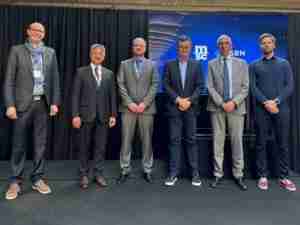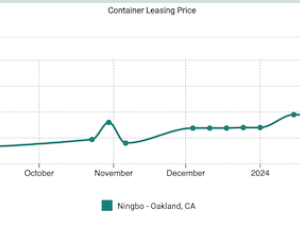Hanjin Shipping Co. Ltd. may be a relative latecomer into the third-party logistics field, but executives of the Korean shipping giant's unit that is dedicated to 3PL functions are confident of success.
"We don't necessarily see disadvantages from being a late entry," said Steven Katz, general manager of operations for Hanjin Logistics Inc. "In fact, I think our timing is quite good."
In a discussion with the American Journal of Transportation, Katz and two other officials of Hanjin Logistics talked about how the wholly owned subsidiary serves the 3PL marketplace.
Katz noted that the official entry of Hanjin into the 3PL industry in January of this year coincides with the tremendous growth in trade with China and throughout the Asian region.
Citing the major presence as an ocean carrier of parent Hanjin Shipping, Katz added, "We have got the backing from one of the largest shipping lines in the world, and they are 110% behind us."
Jim Palumbo, Hanjin Logistics' general manager of sales and marketing, who, like Katz, is based at Hanjin's North America regional headquarters in Paramus, NJ, said, "We have a very client-focused or customer-centric approach. We work closely with customers to understand and address their needs and requirements."
Scot Lindsay, Hanjin Logistics' vice president of national accounts, said that entering the 3PL market years after some other carriers jumped in has had its advantages.
"In looking at other companies' models, you can see some things that work and don't work," said Lindsay, who is based in Cerritos, Calif., near Hanjin's substantial Port of Long Beach operation.
While some others are relying upon broad-reaching "uber sales force" models, Lindsay said, Hanjin Logistics is focused upon providing customers with dedicated resources, with experts who specialize in particular key functions having direct client contact, sometimes even being embedded within the customer's organization.
"People are not just calling into some call center," Lindsay said.
Katz added, "You really are talking about tailor-made programs and customized programs, pulling together resources throughout the supply chain."
Lindsay interjected that logistics providers traditionally "have only touched maybe an inch of the supply chain. Now, you're touching the entire mile of the supply chain."
Katz noted that the Hanjin Logistics subsidiary was created in 2001 to serve primarily as a US domestic positioning unit of Hanjin Shipping, which, like other carriers, was finding a surplus of containers in the US inland that needed to be moved to the West Coast.
As Hanjin officials recognized the need to enter the 3PL industry, the Hanjin Logistics unit was viewed as the "logical" place to put the function, Katz said. The subsidiary has expanded its reach well beyond US domestic rail and trucking to a range of global services that, according to Palumbo, "reach out across the entire supply chain."
In addition to designing domestic programs for such functions as warehousing and distribution, direct-to-store delivery, bypass of distribution centers and intermodal moves, Hanjin Logistics offers numerous programs at the point of shipment origin. These include pick-and-pack operations and multifactory consolidations in South China, as well as vendor management, compliance, workshops and training.
The subsidiary's vendor-neutral positioning facilitates a collaborative approach to supply chain management aimed at minimizing bottom-line costs while enhancing profitability and customer service, the officials said.
"We have a very aggressive business plan for 2006 and 2007," said Palumbo, who noted that Hanjin Logistics currently boasts a small but growing share of Hanjin Shipping's $6 billion gross revenue worldwide.
"One of the important things to recognize today in this market is that manufacturers, importers and retailers are being forced to do business far more efficiently than in the past," Palumbo said. "They a





